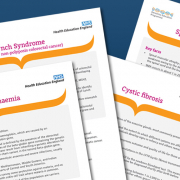
Aimed at primary care health professionals, our factsheets outline the key facts of each condition, plus clinical features, diagnosis, management and treatment.
Haemophilia A and B
Haemophilia is a rare inherited condition that affects the body’s ability to form blood clots. People affected by the condition therefore have an increased tendency to bleed. It is caused by low or absent levels of a blood clotting factor: haemophilia A is due to low levels of clotting factor VIII (FVIII), and haemophilia B is due to low levels of factor IX (FIX). As these two factors form a single functional complex, the clinical features are the same for both.
- Genetic conditions
Hereditary breast and ovarian cancer
Breast cancer is the most commonly diagnosed cancer in the UK, affecting approximately 1 in 8 women during their lifetime. Breast cancer in men is less common, affecting approximately 1 in 870 men during their lifetime. The majority of cases of breast cancer are not due to an inherited condition, but it is important to recognise the 5-10% of breast cancer cases that occur due to an inherited predisposition to develop cancer. Although this is often referred to as inherited cancer, the altered gene is inherited, not the cancer itself. The two major genes associated with familial breast cancer are the BRCA1 and BRCA2 genes.
- Genetic conditions
Isovaleric acidaemia
Isovaleric acidaemia (IVA) is an autosomal recessive disorder caused by the deficiency of the enzyme isovaleryl-CoA dehydrogenase (IVD).
- Genetic conditions
Juvenile polyposis syndrome
Juvenile polyposis syndrome (JPS) is a dominantly inherited disorder, resulting in an increased risk of gastric and colorectal cancer, with additional characteristic manifestations. It is caused by variants in the BMPR1A or SMAD4 genes, although no genetic variant can be identified in between 20% and 30% of cases.
- Genetic conditions
Long QT syndrome
Long QT syndrome (LQTS) is an inherited heart rhythm problem, characterised by QT prolongation and T wave abnormalities on an ECG that are associated with tachyarrhythmias, most typically the ventricular tachycardia torsade de pointes (TdP).
- Genetic conditions
Lynch syndrome
Lynch syndrome (hereditary non-polyposis colorectal cancer (HNPCC)) is an autosomal dominant, inherited cancer predisposition syndrome that causes individuals to have a high lifetime risk of colorectal cancer. It occurs due to the inheritance of an alteration in one of the mismatch repair genes (MLH1, MSH2, MSH6, and PMS2).
- Genetic conditions
Maple syrup urine disease
Maple syrup urine disease (MSUD) is an autosomal recessive disorder that prevents the body from metabolising the branched-chain amino acids: leucine, isoleucine and valine.
- Genetic conditions
Marfan syndrome
Marfan syndrome (MFS) is an autosomal dominant systemic disorder of connective tissue, presenting with skeletal, ocular, skin, and cardiovascular symptoms. It is mainly caused by pathogenic variants in the fibrillin-1 gene (FBN1) on chromosome 15.
- Genetic conditions
Maturity onset diabetes of the young
Maturity onset diabetes of the young (MODY) is an autosomal dominant condition, and a form of monogenic diabetes. It is estimated to cause between 2% and 4% of all cases of diabetes in those younger than 30 years old at diagnosis.
- Genetic conditions
Medium-chain acyl-CoA dehydrogenase deficiency
Medium-chain acyl-CoA dehydrogenase deficiency (MCADD) is an autosomal recessive disorder of fatty acid oxidation that prevents the conversion of fats to energy via hepatic ketogenesis. This impairs the supply of energy to peripheral tissues, causing a continual reliance on glucose to provide energy.
- Genetic conditions
Multiple endocrine neoplasia type 1
Multiple endocrine neoplasia type 1 (MEN1) is an autosomal dominant inherited condition that leads to growth of mainly benign (non-cancerous) tumours of the endocrine glands.
- Genetic conditions
Developing people
for health and
healthcare


